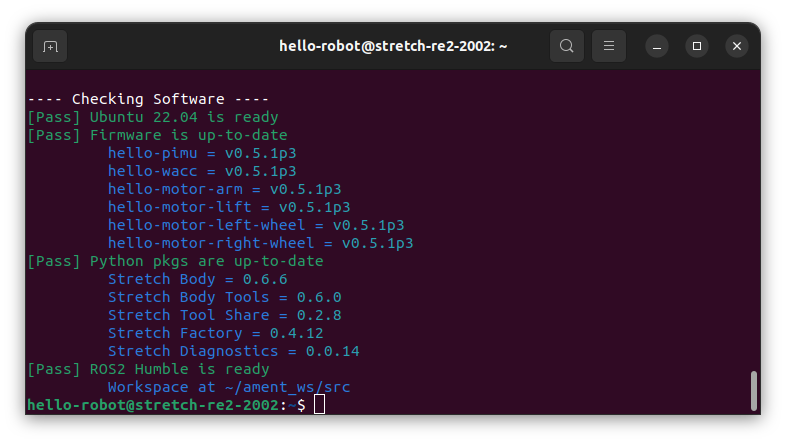Keeping your Software Up-to-date¶
Your Stretch receives a few different kinds of software updates, each with its own procedure for applying the update. This guide covers a strategy for keeping your Stretch's software up-to-date. First, here are the kinds of updates you can expect:
- SDK-level updates: The ROS and Python libraries that constitute Stretch's software development kit (SDK) receive frequent updates. Using the latest SDK ensures access to the latest features and bug-fixes.
- Operating System-level updates: The onboard computer runs an operating system (typically Ubuntu). The OS bundled with the Stretch SDK is called a 'Robot Distribution'. A list of the available distributions is in the Distributions & Roadmap guide. Using the recommended distribution ensures that you receive SDK-level updates.
- Firmware-level updates: While the onboard computer inside Stretch receives SDK and OS-level updates, the microcontrollers powering Stretch's motors and sensors receive firmware-level updates. Using the latest firmware ensures correctness and performance from Stretch's hardware controllers.
Identifying your current software¶
The system check tool can print out a summary of your current software:
stretch_robot_system_check.py
At the bottom of the output, you might see a "Checking Software" section (if this doesn't appear, see below):
If the 'Checking Software' section doesn't appear
It's likely because you're using an older version of the tool. Follow these instructions to collect the same information. You can ask for help on the forum if you run into any issues.
Manually identifying your current software¶
Run the following command to identify the operating system you're running:
lsb_release -d
Description: Ubuntu 22.04.3 LTS
Next, run the following command to identify your firmware:
REx_firmware_updater.py --recommended
Collecting information...
Collecting information...
Collecting information........
######################################## Recommended Firmware Updates ########################################
DEVICE | INSTALLED | RECOMMENDED | ACTION
--------------------------------------------------------------------------------------------------------------
HELLO-MOTOR-ARM | Stepper.v0.5.1p3 | Stepper.v0.6.2p4 | Upgrade recommended
HELLO-MOTOR-RIGHT-WHEEL | Stepper.v0.5.1p3 | Stepper.v0.6.2p4 | Upgrade recommended
HELLO-MOTOR-LEFT-WHEEL | Stepper.v0.5.1p3 | Stepper.v0.6.2p4 | Upgrade recommended
HELLO-PIMU | Pimu.v0.5.1p3 | Pimu.v0.6.1p4 | Upgrade recommended
HELLO-WACC | Wacc.v0.5.1p3 | Wacc.v0.5.1p3 | At most recent version
HELLO-MOTOR-LIFT | Stepper.v0.5.1p3 | Stepper.v0.6.2p4 | Upgrade recommended
Run recommended command:
REx_firmware_updater.py --install --arm --right_wheel --left_wheel --pimu --lift
Next, run the following command to identify which versions of the Python libraries you have:
pip3 list | grep hello
hello-robot@stretch-re2-2002:~$ pip3 list | grep hello
hello-helpers 0.2.0
hello-robot-stretch-body 0.6.6
hello-robot-stretch-body-tools 0.6.0
hello-robot-stretch-diagnostics 0.0.14
hello-robot-stretch-factory 0.4.12
hello-robot-stretch-tool-share 0.2.8
hello-robot-stretch-urdf 0.0.11
Next, run the following command to see if ROS is enabled:
echo $ROS_DISTRO
humble
Next, if ROS is enabled, run the following command to identify your Stretch ROS branch and latest commit:
cd ~/<workspace_dir>/src/<stretch_ros_version> && git branch && git show HEAD --stat
# replace <workspace_dir> with 'ament_ws' if using ROS2 or 'catkin_ws' if using ROS1
# replace <stretch_ros_version> with 'stretch_ros2' if using ROS2 or 'stretch_ros' if using ROS1
* humble below) amd latest commit (99cda32feec0cf67e9b13cc862b4f293dd678c1e below):
* humble
commit 99cda32feec0cf67e9b13cc862b4f293dd678c1e (HEAD -> humble, origin/humble, origin/HEAD)
Author: Binit Shah <bshah@hello-robot.com>
Date: Sun Nov 19 21:46:39 2023 -0500
Update export_urdf.sh
stretch_description/urdf/export_urdf.sh | 23 +++++++++++++----------
1 file changed, 13 insertions(+), 10 deletions(-)
With the information collected here, you'll be able to follow the rest of this tutorial.
Updating Software¶
Robot Distribution¶
| Output | Recommendation |
|---|---|
 |
If your Stretch is running a supported distribution, you can skip to the next section. |
 |
If your Stretch is running a deprecated distribution, it's a good idea to perform the upgrade now. This will update your SDK and firmware as well. Check out the Upgrading your Operating System guide. |
 |
If your code relies on software that has not yet been ported to a newer distribution or if you're in the middle of a project, you may want to hold off on upgrading. If you're starting a new project, it's a good idea to upgrade and build on the latest distribution. Check out the Upgrading your Operating System guide. |
Python Libraries¶
If you see a warning that your Python pkgs are out-of-date, you can run the following command for each package name.
pip3 install -U hello-robot-stretch-<pkg_name>
ROS Workspace¶
If you see a warning that your ROS workspace is out-of-date, you can create a new workspace to replace it. Check out the Updating your ROS Workspace guide.
Firmware¶
If you see a warning that your firmware is out-of-date, you can run the following command.
REx_firmware_updater.py --install
Troubleshooting¶
Param Migration Error¶
If you see the following error:
Please run tool REx_migrate_params.py before continuing. For more details, see https://forum.hello-robot.com/t/425
This error appears because the organization of Stretch's parameters has changed since Stretch Body v0.3 and requires a migration of these parameters to the new organization system. Executing the following command will automaticaly migrate your parameters over:
REx_migrate_params.py
Firmware Mismatch Error¶
If you see the following error:
----------------
Firmware protocol mismatch on /dev/XXXX.
Protocol on board is pX.
Valid protocol is: pX.
Disabling device.
Please upgrade the firmware and/or version of Stretch Body.
----------------
This error appears because the low level Python SDK, Stretch Body, and the firmware cannot communicate to each other. There is a protocol mismatch preventing communication between the two. Simply upgrade Stretch Body using the instructions above.



